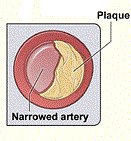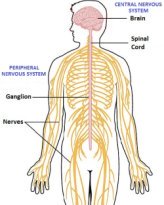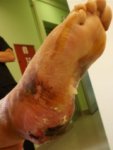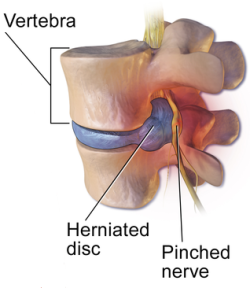Numb feet are a common problem, characterized by a decrease or complete loss in sensation in the foot. Often, it is nothing to worry about and may be as simple as a slightly squashed nerve from sitting awkwardly. But in some cases, it can indicate a more serious underlying medical problem.
Numbness in the foot is often associated with other sensations, typically pain, a burning sensation and/or pins and needles (tingling or prickling sensation), collectively known as paraesthesia. It may occur in one or both feet depending on the underlying cause. Left untreated, it can progress to weakness and decreased control of foot movements.
Here, we will look at the most common causes of numb feet, how they present, how and why they occur and how to tell when it is serious.
Causes of Numb Toes & Feet
Foot numbness develops when there is a communication problem in the nervous system. Sensory nerves receive stimulus such as pressure and temperature information and send electrochemical signals to the brain for interpretation. The brain then sends a corresponding signal back down to the nerve.
Damage to the nerve affects this cycle and numbness in the foot usually develops when these signals are no longer produced. Your body then loses the ability to feel sensory input such as heat/cold and light/sharp pressure therefore feeling numb. The sensation of pins and needles tends to occur when the signals are produced erratically.
The most common causes of numb toes and feet can be split into two categories, those caused by nerve damage and those caused by decreased blood supply. Let’s have a look in more depth.
Foot Numbness From Nerve Damage
1) Temporary Nerve Compression

Numb feet often develop either after we have been sitting awkwardly for a while (e.g. sitting with our feet crossed underneath us) or when wearing tight fitting shoes. This is because the pressure on the nerves and surrounding blood vessels reduces the flow of oxygen and nutrients to the nerve. The foot gradually “falls asleep” and we lose sensation. When we move, we realise we can no longer feel our foot. This is quickly replaced by intense, painful pins and needles as the nerve function restores. After a few minutes the foot numbness and pins and needles subside completely.
2) Peripheral Neuropathy
Damage to the nerves in the leg and foot are another common cause of numb feet. Our nervous systems can be divided into two parts
1) Central Nervous System: Brain and spinal cord
2) Peripheral Nervous System: Nerves that travel round the body
Damage to the peripheral nervous system is known as peripheral neuropathy and affects how signals are transmitted from the nerves to the central nervous system, commonly causing foot numbness. There are a number of different causes of peripheral neuropathy including:
Diabetes: accounts for approximately 30% of all cases peripheral neuropathy
Systemic Diseases: e.g. kidney disorder, vascular damage, chronic inflammation, hormone imbalance, liver disease, cancers and tumors
Vitamin deficiency
Alcoholism
Infections e.g. Lyme Disease
Side effects of medications
Peripheral neuropathy often presents with pain, weakness, altered balance and co-ordination, pins and needles and numb feet. You can find out more about cause of numb feet, including the symptoms and causes in the Peripheral Neuropathy section.
3) Spinal Problems
Problems in the spine that affect the nerves as they come out of the spinal cord can cause numb feet. The two most common causes are:
1) Herniated Disc: Also known as a slipped disc, this can cause foot numbness affecting one or both feet. It develops when one of the discs in the spine is put under too much pressure causing it to bulge and press on the nearby nerve. It is often accompanied by low back pain which can spread down the leg, weakness and pins and needles. Symptoms tend to be worse when you bend forwards or when you cough or sneeze
2) Spinal Stenosis: This is when narrowing of the spinal canal places pressure on the nerves. It often causes bilateral foot numbness which improves when you bend forwards.
You can find out more about slipped discs and spinal stenosis in the Foot Nerve Pain section.
Numb Feet From Reduced Blood Flow
If the blood flow to the foot is reduced, it can result in numb feet due to a lack of oxygen and nutrients reaching the nerves. This can affect how they generate and send impulses. The most common causes of this are:

1) Peripheral Artery Disease: where a build-up of fat and cholesterol narrows the blood vessels. Numbness in feet from PAD tends to be worse when exercising and may be accompanied by fatigue, aching pain and burning in the legs and feet
2) DVT: A deep vein thrombosis is a blood clot. Usually only affects one leg
3) Extreme Cold/Frostbite: Blood vessels constrict in response to low temperatures to help preserve core body temperature
4) Atherosclerosis: Thickening of the arterial wall due to the accumulation of white blood cells
5) Raynaud’s Disease: Condition causing extreme constriction of the blood vessels
Other Causes of Foot Numbness
Multiple Sclerosis: This is an autoimmune disease of the central nervous system (the brain and spinal cord). It is often associated with reduced balance, tingling and extreme itchiness, muscle spasms and difficulty controlling arm and leg movements.
Tarsal Tunnel Syndrome: This is where the posterior tibial nerve gets squashed as it passes through a small space between the foot bones. This may be due to swelling, bone spurs, an injury or abnormal foot position. The most common symptoms are sharp shooting pains with associated pins and needles and foot numbness on the inner side of the ankle or bottom of the foot. Symptoms tend to get worse with prolonged activity.
Is It A Medical Emergency?
If your numb feet are accompanied by any of the following symptoms, consult your doctor immediately:
Bladder or bowel dysfunction: lack of control
Saddle anaesthesia: numbness in your groin
Difficulty walking: particularly tripping over your feet due to not being able to lift your forefoot up
Shortness of breath
Dizziness
Paralysis
Altered vision
Confusion
Loss of consciousness: for any period
Problems with your speech or with swallowing
Sudden, severe pain or numbness: that doesn’t settle in a few minutes
Potential Problems
Prompt treatment for numb feet is vital to prevent further or long-term damage. Failure to do so can lead to disability, paralysis, permanent symptoms of pain and numbness and in extreme cases, may require an amputation.
Achilles Podiatry is the Foot and Ankle Specialist of Indiana and If you believe you may be experiencing numbness of your feet or toes, contact Achilles Podiatry for further evaluation and treatment.
Source: Foot Pain Explored




